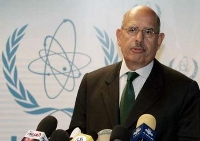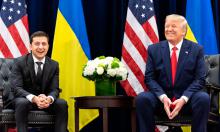USA France and Britain protest to suggestion that Iran be allowed to keep some uranium
The United States has lodged a formal protest with the head of the nuclear watchdog agency for suggesting that Iran be allowed to keep some elements of its uranium enrichment program.France and Britain plan to do the same.

The diplomats said Gregory L. Schulte, the chief U.S. representative to the International Atomic Energy Agency, had expressed his displeasure in a meeting Wednesday with IAEA chief Mohamed ElBaradei. His British and French counterparts would follow suit as early as Friday, said the diplomats, who demanded anonymity because their information was confidential.
"They have an appointment with ElBaradei tomorrow," said one of the diplomats, alluding to the heads of the British and French missions to the IAEA.
IAEA spokeswoman Melissa Fleming confirmed that Schulte and ElBaradei had met Wednesday but declined to elaborate beyond saying the mood was "cordial."
Diplomats first revealed such plans on Tuesday, saying the U.S. was seeking allied support for a protest. On Thursday, they told The Associated Press that Washington had enlisted the French and British. Canada, Australia and several other countries normally backing Washington on Iran had not made a decision as of Thursday on whether to back the move, they said.
France had already publicly rebuffed ElBaradei on Wednesday. French Foreign Ministry spokesman Jean-Baptiste Mattei said Paris shared "the gist of concerns expressed by our American partners along with several other partners, for that matter," adding: "I can confirm that our permanent representative in Vienna will take part in the American initiative."
The three nations apparently are concerned that ElBaradei's statements could exacerbate traditional splits between Russia and China and the United States, Britain and France, the three other permanent Security Council members on how to deal with Tehran's nuclear defiance.
While the Western council members have traditionally pushed for tough sanctions on Iran for refusing a council demand that it freeze all enrichment activities, opposition by Moscow and Beijing has led them to settle for watered-down sanctions less rigid than they originally proposed since the first set was agreed on Dec. 23.
The issue gained in importance Wednesday, when ElBaradei sent a report to the Security Council that says Iran has expanded its enrichment activities instead of freezing them a finding that could act as a trigger for a third set of sanctions.
Subscribe to Pravda.Ru Telegram channel, Facebook, RSS!





